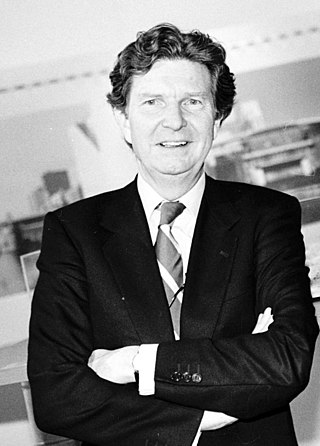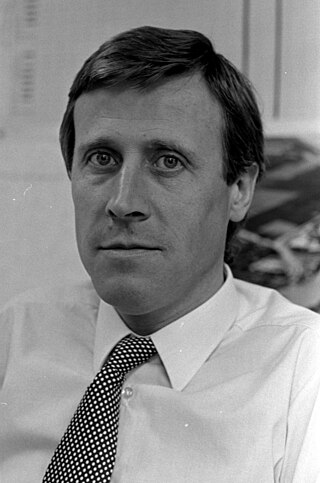
MVRDV is a Rotterdam, Netherlands-based architecture and urban design practice founded in 1993, with additional offices in Berlin, New York, Paris, and Shanghai. It is currently regarded as one of the world's finest architecture firms. MVRDV is an acronym of the founding members' surnames: Winy Maas, Jacob van Rijs, and Nathalie de Vries.

Willem Marinus Dudok was a Dutch modernist architect. He was born in Amsterdam. He became City Architect for the town of Hilversum in 1928 where he was best known for the brick Hilversum Town Hall, completed in 1931. Not only did he design the building, but also the interior including the carpets, furniture and even the mayor's meeting hammer. He also designed and built about 75 houses, public buildings and entire neighborhoods.

Mart Stam was a Dutch architect, urban planner, and furniture designer. Stam was extraordinarily well-connected, and his career intersects with important moments in the history of 20th-century European architecture, including the invention of the cantilever chair, teaching at the Bauhaus, contributions to the Weissenhof Estate, the Van Nelle Factory,, buildings for Ernst May's New Frankfurt housing estates, followed by work in the USSR with the idealistic May Brigade, to teaching positions in Amsterdam and post-war East Germany. Upon return to the Netherlands he contributed to postwar reconstruction and finally retired,, in Switzerland, where he died.
Mecanoo is an architecture firm based in Delft, Netherlands. Mecanoo was founded in 1984 by Francine Houben, Henk Döll, Roelf Steenhuis, Erick van Egeraat and Chris de Weijer.

Jo Coenen is a Dutch architect and urban planner. He studied architecture at the Eindhoven University of Technology, and later held professorships at TU Karlsruhe, Eindhoven University of Technology and Delft University of Technology.

Wilhelmus "Winy" Maas is a Dutch architect, landscape architect, professor and urbanist. In 1993 together with Jacob van Rijs and Nathalie de Vries he set up MVRDV.

Jacob van Rijs Ir. FRIBA is a Dutch architect, urban planner and one of MVRDV’s three founding partners. Besides giving lectures worldwide van Rijs is also professor Entwerfen und Baukonstruktion at the Technical University of Berlin. Moreover, he regularly lectures and takes part in student juriesat universities and institutes worldwide. His teaching experience comprehends TU Munich, TU Delft, University of Wismar, ETSAM University Madrid, Royal Academy of Arts Copenhagen, Tokyo Institute of Technology and Rice University, Houston, amongst others. Within the Royal Institute of Dutch Architects (BNA) he is chairman of the International Programme, creating a better support and stimulation for Dutch architects in their activities across the border worldwide. He also holds a position in the Dutch Trade and Investment Board (DTIB) from where he represents architects an international trade and investment level.

Erick van Egeraat is a Dutch architect and author. He heads the architectural practice based in Rotterdam with offices in Moscow, Budapest and Prague. He is best known for his projects of ING Group Headquarters in Budapest, Drents Museum in Assen, The Rock tower in Amsterdam, Incineration line in Roskilde, Main building and Auditorium in Leipzig University and the Corporate University of Sberbank in Moscow. He is the winner of RIBA Award 2007, Best Building Award 2011&2012 and European Property Award 2013.

West 8 is an urban planning and landscape architecture firm founded by Adriaan Geuze and Paul van Beek in Rotterdam, Netherlands in 1987. It is known for its contemporary designs and innovative solutions to urban planning problems using lighting, metal structures, and color. Van Beek is no longer part of the firm.

Francine Marie Jeanne Houben is a Dutch architect. She graduated with cum laude honours from the Delft University of Technology. She is the founding partner and creative director of Mecanoo architecten, based in Delft, The Netherlands.
Atelier Kempe Thill is an architectural firm that includes Oliver Thill and André Kempe, originally from East Germany who graduated of TU Dresden. They are now based in Rotterdam, Netherlands.

Claus en Kaan Architecten was a Dutch architecture firm founded in 1987 by Felix Claus and Kees Kaan, led together with partners Vincent Panhuysen and Dikkie Scipio.

The KNSM Island is a man-made island in the Eastern Docklands of Amsterdam. KNSM stands for the Koninklijke Nederlandsche Stoomboot-Maatschappij, the Royal Dutch Steamboat Shipping company which used to have its headquarters and its docks on the island. It is now a large residential area containing modern architecture with a mostly well-off population.

Reinier de Graaf is a Dutch architect, architectural theorist, urbanist and writer. He is a partner in the Office for Metropolitan Architecture (OMA), and author of the books Four Walls and a Roof: The Complex Nature of a Simple Profession and The Masterplan.

Hubert-Jan Henket is a Dutch architect. He is a specialist in the relations between old and new buildings, the redesign of buildings, renovation and restoration. He is the founder of DOCOMOMO international.
The International Architecture Biennale Rotterdam (IABR) is a bi-annual international event bringing together international knowledge and experience in various design disciplines, and presenting this knowledge and experience to a broader audience.
Andreas Quednau is a German architect, and professor of architecture and urbanism. He is principal of the firm SMAQ for architecture, urbanism and research, that is based in Berlin, Germany. He is Professor of Urban Design at Leibniz University Hannover.

Antoni Scholtens Folkers is a Dutch architect, urbanist and researcher. Folkers studied at the Faculty of Architecture and Urban Planning at Delft University of Technology where he also received his Ph.D. in 2011. His doctoral dissertation was later published as the book Modern Architecture in Africa. Folkers is one of the founding partners of the research and educational platforms ArchiAfrika and African Architecture Matters.

ZJA is a Dutch architectural studio located in Amsterdam and founded in 1990 by Rein Jansma (1959-2023) and Moshé Zwarts (1937-2019). To date, the studio has approximately 50 staff and the partners are Ralph Kieft, Reinald Top and Rob Torsing.

Wim Quist was a Dutch architect. Part of the modernist tradition of architecture, his style was dominated by rectangular, triangular and circular forms. His buildings focussed on the relationship between the building and its surroundings, with the function of the building itself being central. He rejected the use of unnecessary decoration. He continued designing buildings from 1960 until retiring in 2003 - his architectural legacy is now visible all over the Netherlands.

















